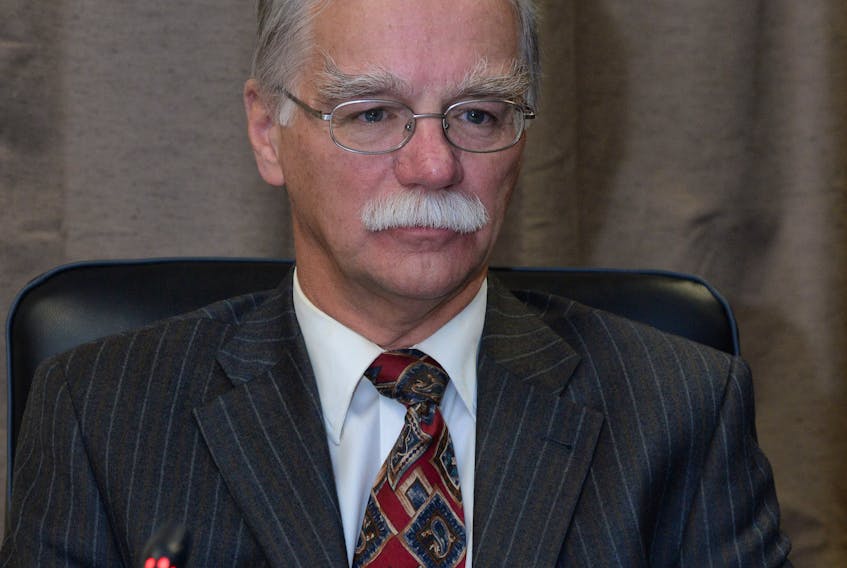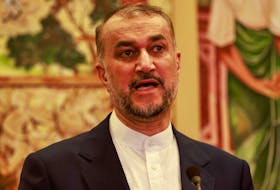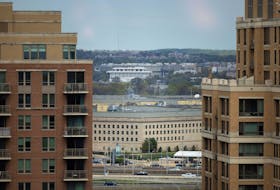Just before the project’s sanctioning in 2012, Nalcor Energy’s Muskrat Falls project team was working a “highly unlikely” schedule and a cost estimate at serious risk for an increase, according to two consultants who testified Wednesday at the Muskrat Falls Inquiry.
Newfoundland and Labrador Hydro’s former vice-president of engineering, John Mallam, now a board member at Nalcor Energy, continued his testimony Wednesday, having begun Tuesday. Mallam was part of two “independent project review” (IPR) teams — one looking at work on the project to 2010, at what was called “decision gate two” (DG2) and another at “decision gate three” (DG3) with advanced project engineering, shortly before final approval in 2012.
“The only comment I could make is that it seemed obvious to us that it was highly unlikely that the schedule they proposed could be met,” Mallam said about the earliest review.
By DG3, the schedule was slipping, he said.
On estimated cost, Mallam said a flat 10 per cent contingency for the project was not what he would have expected, and it falls “below what any reasonable standard would suggest should be required.”
He said he would have gone with more (given a P50 probability factor was used in developing estimates, when projects from throughout his time at Hydro used P70 to P90).
Looking at when the public was being told the estimated cost was $6.2 billion, Mallam said he would have expected that estimate to be more in the range of $7 billion to $8 billion, plus added “float to the schedule,” even if the review team’s report never said as much.
Mallam joined Newfoundland and Labrador Hydro (a Nalcor Energy subsidiary) following his graduation from Memorial University in 1975. In October 2010, he moved from Hydro to work for the Lower Churchill Project (what became better known as the Muskrat Falls project), having “little to no involvement” before that. He helped to develop the estimates for the long-term, annual operating and maintenance costs. He retired in May 2012, and said the estimate for those costs “wasn’t even a first draft” at that point.
Asked about conflict
Mallam was asked if he had any reservations about his later involvement in the “cold eyes review,” given he had worked on the project.
He said professionals within Hydro review each other’s work, and the reports for Muskrat Falls show no one shied from critical review.
Derek Owen of RDO Consulting, the leader of both internal independent reviews, was called to the stand after Mallam. He said documentation given to the review teams didn’t show benchmarking for the various project pieces, as he would have expected — for example, considering placement of large amounts of concrete by referring to past megaprojects involving concrete pours in Newfoundland and Labrador.
Like Mallam, Owen said he thought there was a lack of hydroelectric megaproject experience on Nalcor Energy’s management team for the project. He referred, in comparison, to the full-time work around the world of project managers employed by multinational oil companies.
On conflict, Owen said there was “zero risk” of Mallam’s history leading to a biased report. He said the same for team member Richard Westney of Westney Consulting, whose company completed work for the project, for Bernie Osiowy, who worked with Manitoba Hydro for 40 years, with that utility also doing a Muskrat Falls-related review, and for Tim Leopold, who had worked with Nova Scotia Power and joined the independent project review (IPR) team for its final review.
Owen had also contracted for professional services on the project, through RDO Consulting, at the time of early project review in 2008. He said the IPR team brought together was a team of professionals with extensive experience, capable of detaching themselves from any past business or personal history to work in a “review mode.”
And he was less concerned with any perception of conflict, he said, than with professional conduct.
“That may be wrong from my side, but I stand by my experience, my integrity, and I was willing to stand by John’s integrity and by Dick Westney’s integrity,” he said, listing team members.
He explained the review team is not tasked with an audit, but with assessing the processes used — understanding how a schedule was developed, for example, as opposed to saying a piece of work was appropriate for a certain time.
Owen’s testimony is set to continue Thursday.
Tom Brockway from Grant Thornton is scheduled to appear beginning Thursday and closing out the week, testifying over the course of two days.
Inquiry co-counsel Kate O’Brien indicated Brockway will be asked to respond to questions relating to Nova Scotia, the Maritime Link and contracts with Emera.
Note: The photo caption has been edited from a previous version to correctly identify John Mallam.









